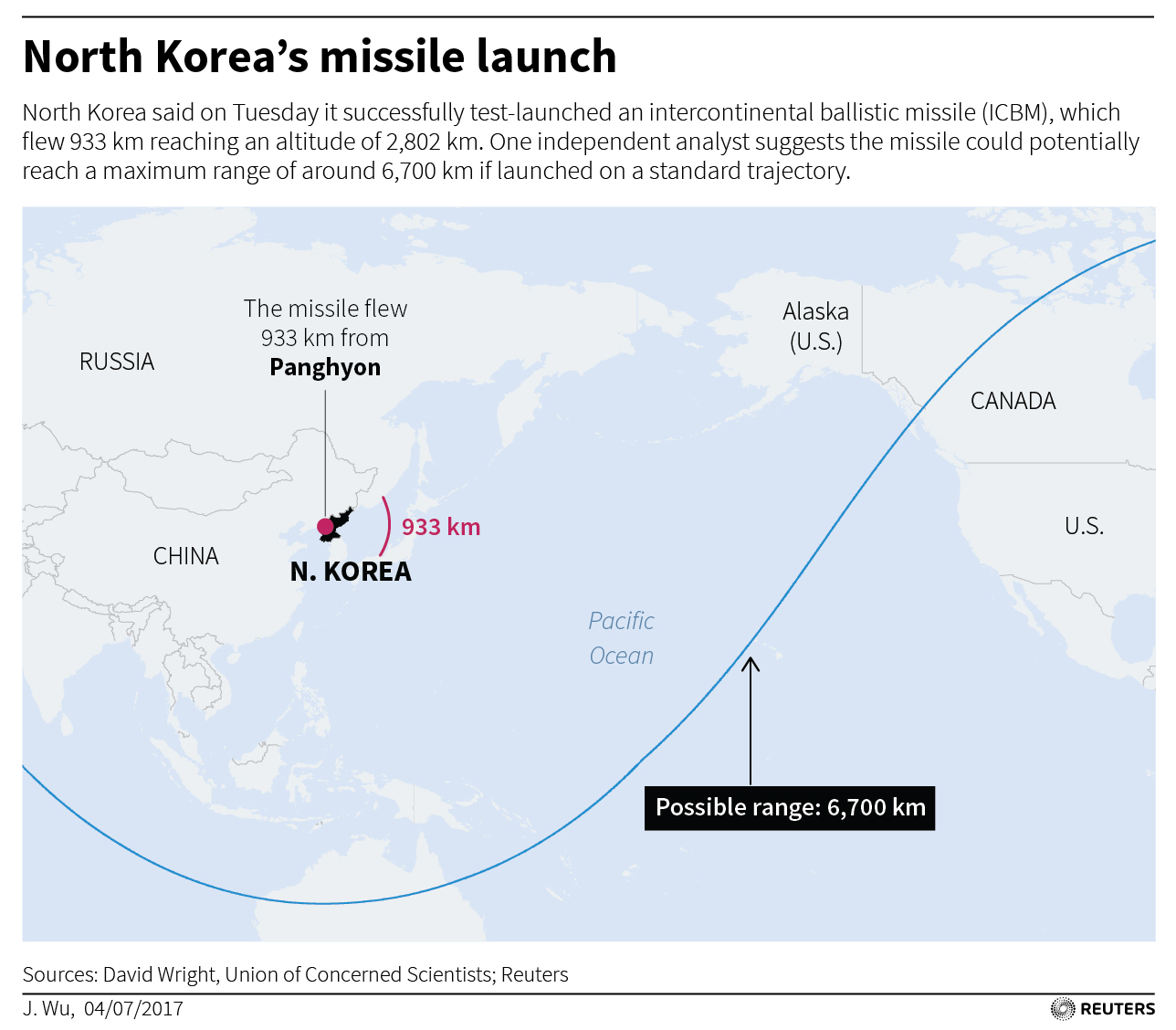
By Phil Stewart
WASHINGTON (Reuters) – The United States plans to carry out a new test of its THAAD missile defense system against an intermediate-range ballistic missile in the coming days, two U.S. officials told Reuters on Friday, as tensions with North Korea climb.
Despite being planned months ago, the U.S. missile defense test will gain significance in the wake of North Korea’s launch of an intercontinental ballistic missile (ICBM) on July 4 that has heightened concerns about the threat from Pyongyang.
The test will be the first of the Terminal High Altitude Area Defense (THAAD) to defend against a simulated attack by an intermediate-range ballistic missile (IRBM), one of the officials said. The THAAD interceptors will be fired from Alaska.
The United States has THAAD interceptors in Guam that are meant to help guard against a missile attack from a country such as North Korea.
The officials who disclosed to Reuters the precise nature and timing of the upcoming test spoke on condition of anonymity.
Asked by Reuters, the U.S. Missile Defense Agency (MDA) confirmed that it aimed to carry out a THAAD flight test “in early July.”
Chris Johnson, an MDA spokesman, said the THAAD weapon system at the Pacific Spaceport Complex Alaska in Kodiak, Alaska, would “detect, track and engage a target with a THAAD interceptor.”
“The test is designated as Flight Test THAAD (FTT)-18,” Johnson said. He did not elaborate.
Still, in recent testimony to Congress, Vice Admiral James Syring, then the director of the Missile Defense Agency, said FTT-18 would aim to demonstrate THAAD’s ability to intercept a separating IRBM target.
MDA said THAAD had a 100 percent successful track record in its 13 flight tests since 2006. After previous tests, the U.S. military has publicly disclosed the results.
SOUTH KOREAN DEPLOYMENT
THAAD is a ground-based missile defense system designed to shoot down short-, medium- and intermediate-range ballistic missiles.
Lockheed Martin Corp, the prime contractor for the THAAD system, said it has the ability to intercept incoming missiles both inside and outside the Earth’s atmosphere.
This year’s U.S. deployment of THAAD in South Korea to guard against North Korea’s shorter-range missiles has also drawn fierce criticism from China, which says the system’s powerful radar can probe deep into its territory.
Earlier this month Moscow and Beijing, in a joint statement, called on Washington to immediately halt deployment of THAAD in South Korea.
The statement said Washington was using North Korea as a pretext to expand its military infrastructure in Asia and risked upsetting the strategic balance of power in the region.
THAAD’s success rate in testing is far higher than the one for America’s Ground-based Midcourse Defense system (GMD), the system specifically designed to shoot down an ICBM headed for the U.S. mainland.
That GMD system has only a 55 percent success rate over the life of the program. But advocates note that the technology has improved dramatically in recent years.
In a key development, the GMD system successfully shot down an incoming, simulated North Korean ICBM in a test in May.
That led the Pentagon to upgrade its assessment of America’s ability to defend against a small number of ICBMs, according to an internal memo seen by Reuters.
MDA told Congress in June that it plans to deliver 52 more THAAD interceptors to the U.S. Army between October 2017 and September 2018, for a total of 210 since May 2011.
In a sign of U.S. congressional concern about missile defense, several lawmakers filed amendments to a sweeping defense policy bill on Friday that addressed North Korea. Republican Representative Don Young, whose home state Alaska is seen as especially vulnerable to the North Korea threat, asked for more ground-based interceptors for his state, and a study of potential additional sites on the East Coast or Midwest.
Democratic Representatives John Conyers and Sheila Jackson Lee, along with Republican Walter Jones, filed an amendment to the annual National Defense Authorization Act saying that nothing in the bill should be construed as authorizing the use of force against North Korea.
The full House of Representatives is due to consider the bill, and its amendments, next week.
(Reporting by Phil Stewart; Additional reporting by Patricia Zengerle; Editing by Lisa Shumaker and James Dalgleish)










